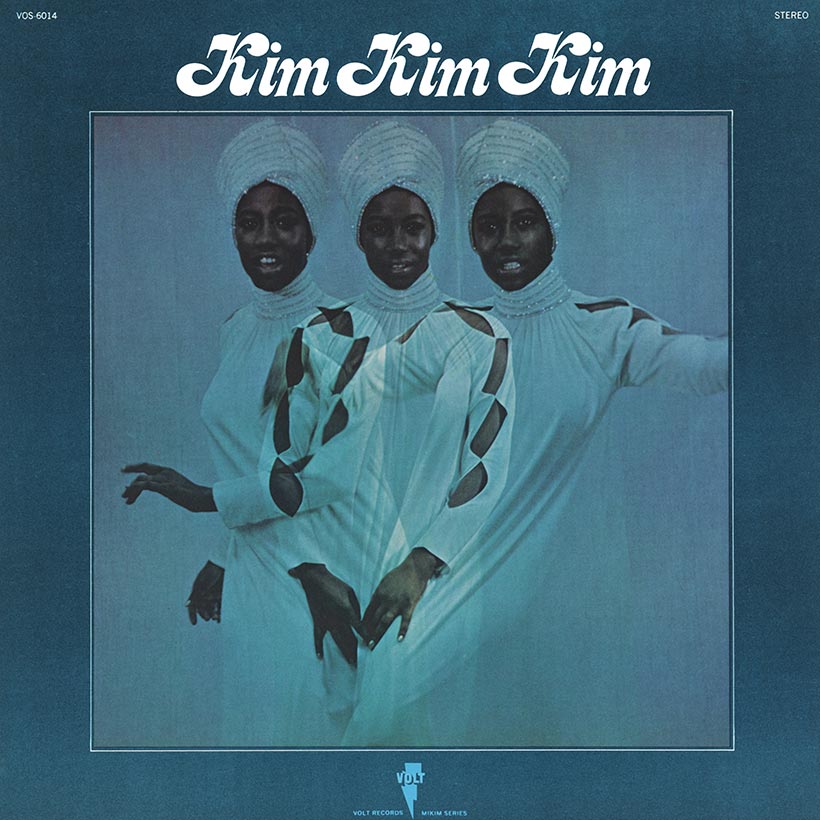Though Kim Weston is primarily thought of as a Motown artist, the fact she never released a solo album during nigh-on four years at Hitsville USA suggests that the company didn’t quite see her that way – and nor did she, perhaps. During her prime, Kim never stopped anywhere long: two albums at MGM, one at People, and one duet album each at Motown and Banyan Tree represented her long-playing output in the 60s and 70s. Oh, and there’s this 1970 album recorded for Stax, Kim Kim Kim – fascinating and soulful, but overlooked.
She knew her worth
By the time she arrived at Stax, Weston’s fame was past its peak. One of Motown’s greatest voices, her talent was not matched by her success. She hit with the exhilarating “It Takes Two” alongside Marvin Gaye in late 1966/early ’67, and two of her solo singles, “Helpless” and ʻTake Me In Your Arms (Rock Me A Little While),” were among the finest Motown records of the mid-60s, yet still failed to dent the US Top 50. She had talent, but Motown didn’t make the most of it – or, at least, didn’t promote it properly. Weston knew her worth, however, falling out with the label over royalties and heading to MGM with her husband, Motown writer, producer, and A&R man Mickey Stevenson. Two albums later, including the curious, partially flag-waving MOR excursion This Is America, she was out of contract again.
Weston’s eventual arrival at Stax after recording for Motown was unusual, but not unique: Mable John had preceded her, and had made a long-awaited chart breakthrough with “Your Good Thing Is About To End,” her first release for the Memphis label. Swing balladeer Billy Eckstine made the same journey, but in a near 40-year recording career, it would have been surprising if he hadn’t because he’d worked everywhere else. The question was, could Kim Weston finally shake off her lack of success by heading south to Memphis?
Best Stax Vocal Groups: 11 Essential Acts You Need To Know
“Soul Explosion’: A Dynamite Compilation From Stax Records
“Black Moses’: Devote Yourself To Isaac Hayes’ Classic Album
Pure soul music: warm and glowing
Working with producers Al Bell (Stax’s boss and earthly overseer of The Staple Singers), Clarence Paul (key to Stevie Wonder’s late-teens 60s revival), and Isaac Hayes (The Man) should have helped break Kim’s curse. Kim Kim Kim is pure soul music: warm, heartfelt, and glowing. But it was not terribly commercial. It’s noteworthy that Hayes didn’t compose any songs for the album, which is like getting Charles Dickens to design a book jacket without writing a word. The one tune with his writing credit is the former Sam & Dave hit “When Something Is Wrong With My Baby,” one of the best tracks on Kim Kim Kim and surely a hint to artist, producer, and executive producer, Mickey Stevenson. But all concerned were obviously serious about Weston’s arrival on Stax’s Volt imprint, even allocating a logo to the album that proudly declared it part of the “Mikim Series” – ie Mickey and Kim. It is sadly telling that this was the only album to come out under that banner.
Kim Kim Kim’s opening track, “You Just Don’t Know,” has an orchestrated intro that immediately informs you just how huge it is going to sound. The singing is amazing; there’s a vague resemblance to Yvonne Elliman’s “Stay With Me Baby,” but no sense that Kim is straining. The kitchen sink is thrown at the arrangement and you’d never mistake this for background music. “The Love I’ve Been Looking For” performs the same trick while dialing things back a little, though Kim is still astonishingly powerful.
Leon Ware and Vicki Basemore’s tale of a life maturing, “What Could Be Better,” is calmer, though the orchestras and reach-for-the-skies vocal chorus of previous tracks is still here. “When Something Is Wrong With My Baby” kicks off with a big-band blues feel, strips down for the verses, and dresses up again for the chorus. It’s fuller than Sam & Dave’s version, but smaller than its predecessors on the album. Weston, of course, sings it impeccably.
Superb early 70s soul music
By now a more dramatic change of tone is called for, and it arrives with the uptempo “Love Vibrations,” a rolling, bass-driven, 60s-styled dancer with echoing, psychedelic soul-style guitar. Further groove kicks in on “Soul On Fire,” a phonky blues more suited to Betty Harris or Ann Sexton, say, than Kim’s more uptown voice, and the message song “Brothers And Sisters (Get Together),” which features brass like elephants trumpeting and a deep lowdown groove – Norman Whitfield’s influence looms large on this cut.
In total contrast, “Buy Myself A Man” is subtle, soulful, and surprisingly touching, as Kim confesses that her live-in lover is sleeping on the floor rather than sharing her bed, and dreams of retail therapy as the source of a loving fella. The track has a distinctly Chicago feel, like something Barbara Acklin might have delivered, and the same applies to the tender version of Solomon Burke’s “Got To Get You Off My Mind.” This is superb early 70s soul music.
A connection to Weston’s recent past brought about one of the best tunes here, penned by psych-pop songwriter Toby Ben, whom Mickey Stevenson had signed to MGM and Clarence Paul had produced. Kim sings her heart out on her superior cut of his “Penny Blues,” a torchy waltz ballad of hard times, accompanied by hurt harmonica and striking strings. The album closes with a lush slice of gospel, “The Choice Is Up To You (Walk With Me Jesus),” which has a slight air of the era’s Diana Ross, with, again, soaring backing vocals akin to The Andantes.
Highly spirited and moving
Kim Kim Kim proved a mixed blessing. It is fully a soul record, but mixed up its styles somewhat, rather than aiming at one market. Kim Weston was perhaps in the right place at the wrong time: if Isaac Hayes hadn’t been focused on his own burgeoning career, if The Staple Singers weren’t about to make their big commercial breakthrough, absorbing a lot of Al Bell’s attention, who knows what might have happened?
What did happen was a scattering of singles for Stax, releases slowing to a halt in the 70s, and no further Kim Weston releases until Ian Levine produced her on the 1987 hi-NRG classic “Signal Your Intention,” which showed that her soul chops were fully intact.
Kim should have been so much bigger. Kim Kim Kim could have done so much better, for want of a more definite direction. Perhaps covering too many bases and relying too heavily on her amazing voice to pull them together, it’s nevertheless highly spirited and moving. And that is soul.




